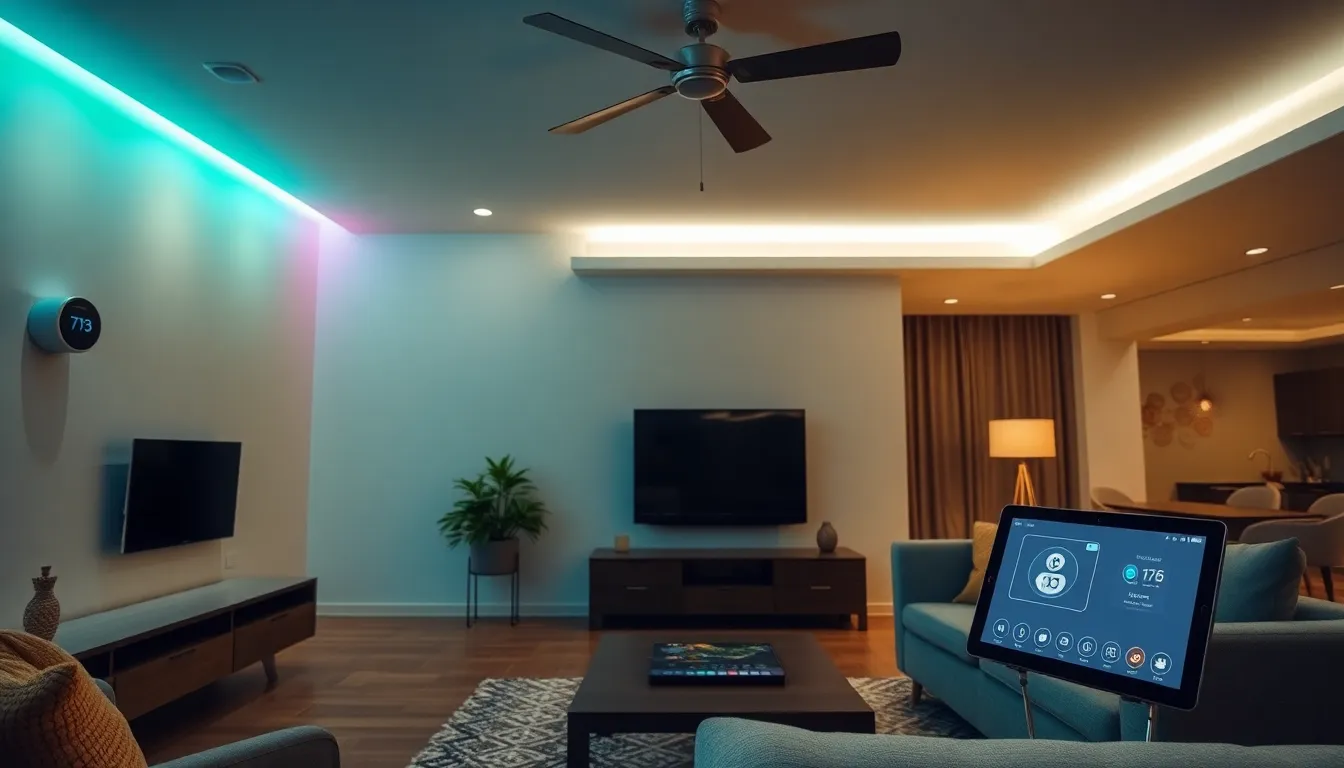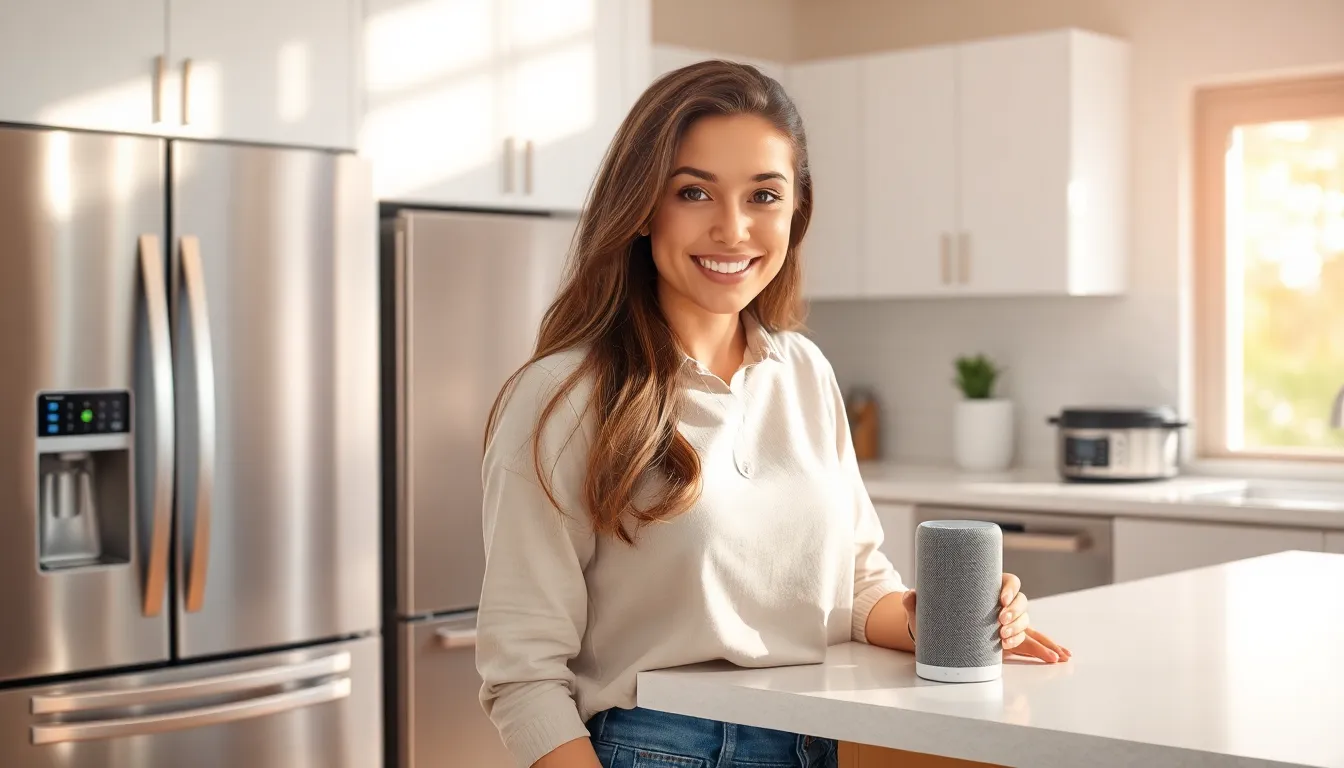Imagine walking into your home and having it greet you like an old friend. Lights flicker on, the thermostat adjusts to your preferred temperature, and your favorite playlist starts playing—all without lifting a finger. Welcome to the world of home control systems, where technology meets convenience in a way that makes everyday life feel like a sci-fi movie.
These systems aren’t just for tech enthusiasts anymore; they’re for anyone who wants to turn their home into a smart haven. With gadgets that can control everything from lighting to security, home control systems are here to save the day, one button press at a time. So, if you’re tired of feeling like a caveman in your own living room, it’s time to explore how these nifty innovations can transform your space into a high-tech paradise.
Table of Contents
ToggleOverview of Home Control Systems
Home control systems play a vital role in modern living, facilitating comfort and convenience. They enable users to manage various devices within their homes seamlessly. Smart thermostats, for example, allow for temperature adjustments remotely based on daily routines.
Lighting systems can be programmed to change according to the time of day or user preferences. Such automation enhances not only energy efficiency but also security, as users can simulate occupancy when away.
Entertainment options expand significantly with home control systems. Homeowners can integrate audio and visual equipment to create personalized experiences. Many systems support multi-room audio, letting individuals enjoy music in various spaces simultaneously.
User interfaces for these systems often feature intuitive apps. Mobile applications allow for easy control of devices with just a few taps or voice commands. Voice-controlled assistants provide additional ease, enabling hands-free operation for different tasks.
Integration is also a key benefit. Home control systems often connect with other smart technologies like security cameras and smart locks. This interconnectedness enhances safety and allows for coordinated responses to various scenarios, such as alerts when someone approaches the home.
Lastly, customization options abound. Users can set routines that automatically adjust settings for wake-up, leaving, or bedtime. Personalization not only maximizes comfort but also optimizes everyday experiences.
Home control systems transform traditional living spaces, providing efficiency and enhancing overall quality of life.
Features of Home Control Systems

Home control systems offer various features that enhance convenience and efficiency in daily life. These features cater to a wide range of needs and preferences, ensuring a smart living environment.
Smart Lighting Control
Smart lighting control optimizes energy usage and enhances ambiance. Homeowners can program lighting schedules based on activities, ensuring lights activate at desired times. Some systems allow remote access, enabling users to manage lights from anywhere with a mobile app. Advanced options include voice commands for hands-free adjustments. Custom color schemes let users create desired moods for different occasions. This flexibility not only enhances comfort but also improves security by simulating occupancy when away.
Climate Control
Climate control systems allow seamless management of home temperatures, contributing to energy savings. Homeowners can install smart thermostats that adjust settings based on preferences and occupancy. Systems learn user behavior, making automatic adjustments for efficiency. Remote access offers monitoring and adjustments while away from home. Some advanced models integrate with weather forecasts, optimizing climate settings based on external conditions. Maintaining consistent comfort enhances overall well-being and reduces energy expenditures.
Security Integration
Security integration enhances safety and provides peace of mind in smart homes. Home control systems often feature compatibility with security cameras and smart locks. Users can monitor their homes in real time using mobile devices, receiving alerts about unusual activities. Some systems automate locking doors at specific times, ensuring security when homeowners are away. Integration with alarm systems enhances coordinated responses during emergencies. This comprehensive approach to security allows for a safer living environment and promotes proactive safety measures.
Benefits of Home Control Systems
Home control systems offer numerous advantages that enhance living spaces and simplify daily routines.
Energy Efficiency
Energy efficiency stands as a primary benefit of home control systems. Smart thermostats adjust heating and cooling automatically based on user preferences, reducing unnecessary energy consumption. Programmable lighting enables users to manage light schedules, ensuring that lights only activate when needed. Utility bills often decrease significantly when homeowners utilize these energy-saving features. Many systems also provide real-time energy usage statistics, enabling users to monitor consumption and make informed adjustments.
Enhanced Security
Enhanced security features provide peace of mind for homeowners. Smart locks allow users to secure their homes remotely, granting access only to trusted individuals. Security cameras integrate seamlessly with home control systems, allowing for real-time monitoring via mobile devices. Alerts notify homeowners of unusual activities, promoting immediate responses to potential threats. Many systems support scheduled lock routines, automatically securing doors at specified times. Consequently, users experience a heightened sense of safety within their living environments.
Convenience and Accessibility
Convenience and accessibility significantly improve with home control systems. Homeowners can manage multiple devices through intuitive mobile apps, making control effortless. Voice assistants enhance this ease of use, allowing users to command their systems hands-free. Scheduling features enable activities, such as adjusting temperatures or turning on lights, according to daily routines. Customization options ensure that each user’s preferences are met, tailoring experiences to specific needs. Overall, the seamless integration of various home devices increases daily convenience and transforms how homeowners interact with their spaces.
Popular Home Control Systems on the Market
Numerous home control systems offer a range of features to enhance user experience. Increased automation and connectivity define many of these systems, making them appealing options for modern households.
System Comparisons
Various home control systems stand out in functionality and integration. For instance, Google Nest integrates seamlessly with smart devices and offers robust voice control features. Amazon Echo provides a wide compatibility range but emphasizes ease of use with Alexa. Apple HomeKit excels in security and privacy, ensuring users feel safe while controlling their home environment. Of note, Samsung SmartThings combines different device brands under one platform, enhancing flexibility. Each system presents unique advantages, allowing users to select one that aligns with their specific needs.
User Reviews and Ratings
User feedback highlights significant differences among home control systems. Google Nest consistently receives positive ratings for its user-friendly interface and innovative features. Many homeowners appreciate Amazon Echo for its extensive device compatibility and quality sound. Apple HomeKit’s dedication to security often garners praise, attracting users concerned about privacy. Samsung SmartThings is noted for its versatility, earning favorable reviews for smart home integrations. User experiences collectively shape opinions, guiding potential buyers toward the most suitable options for their homes.
Future Trends in Home Control Systems
Innovations in home control systems continue to reshape daily living. One significant trend involves increased integration with artificial intelligence. Machine learning enables smart systems to personalize user experiences by analyzing habits and preferences over time.
Voice recognition technology is advancing as well. Smart assistants are becoming more capable, allowing users to control various devices hands-free effortlessly. Enhanced natural language processing makes interactions smoother and more intuitive.
Another emerging focus is interoperability among different smart devices. Home control systems are evolving to ensure that various brands and technologies work seamlessly together. This flexibility helps users create customized smart environments tailored to their specific needs.
Energy efficiency remains a priority across the industry. Newer systems incorporate advanced features that monitor energy use and suggest optimizations. Homeowners benefit from reduced utility bills while minimizing their carbon footprint.
In addition, security features are becoming more sophisticated. Smart cameras and doorbells are integrating with home control systems to provide comprehensive surveillance and real-time alerts. Enhanced encryption methods also protect user data, ensuring greater privacy.
Telehealth integration is gaining traction, especially as health awareness increases. Some home control systems now incorporate health monitoring technologies, allowing users to track well-being from home. This shift reflects a growing emphasis on holistic living.
Lastly, the growing trend of DIY smart home setups is noteworthy. Consumers are increasingly seeking affordable, easy-to-install options that require minimal technical knowledge. As manufacturers respond by offering user-friendly products, more homes transition to smart environments.
Home control systems are revolutionizing the way people interact with their living spaces. By offering seamless automation and integration of various devices, these systems enhance comfort and efficiency in daily routines. As technology advances, the potential for customization and improved user experiences continues to grow.
With options available for every budget and lifestyle, homeowners can easily find solutions that fit their needs. The future of home control systems promises even greater advancements in AI integration and security features. Embracing these innovations not only transforms homes into smart environments but also elevates overall quality of life.








